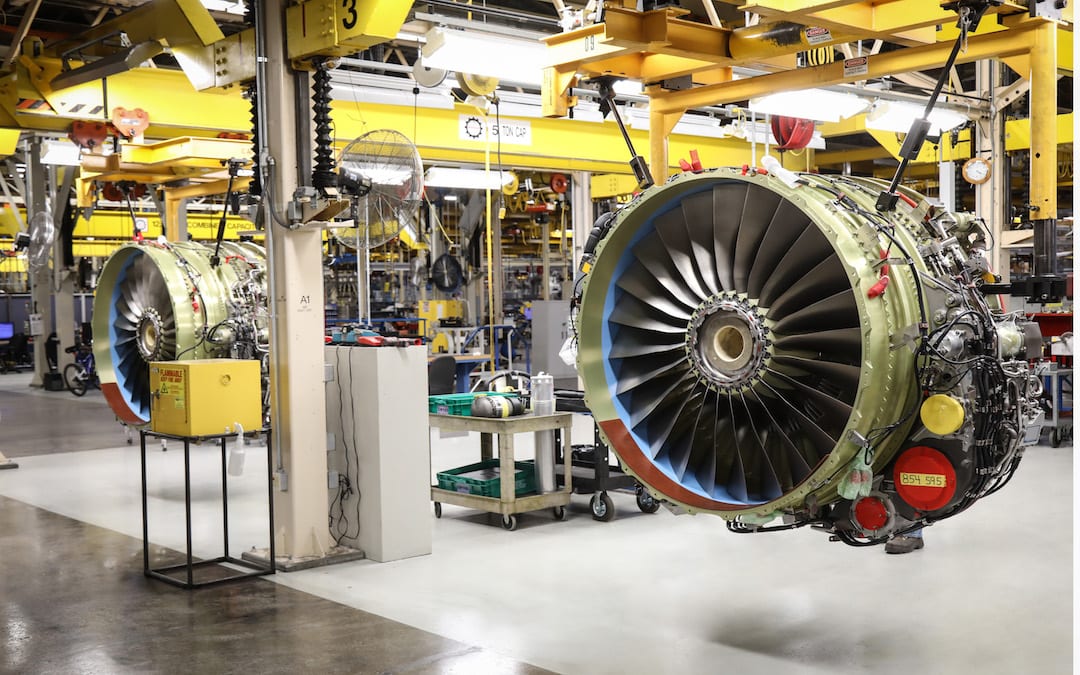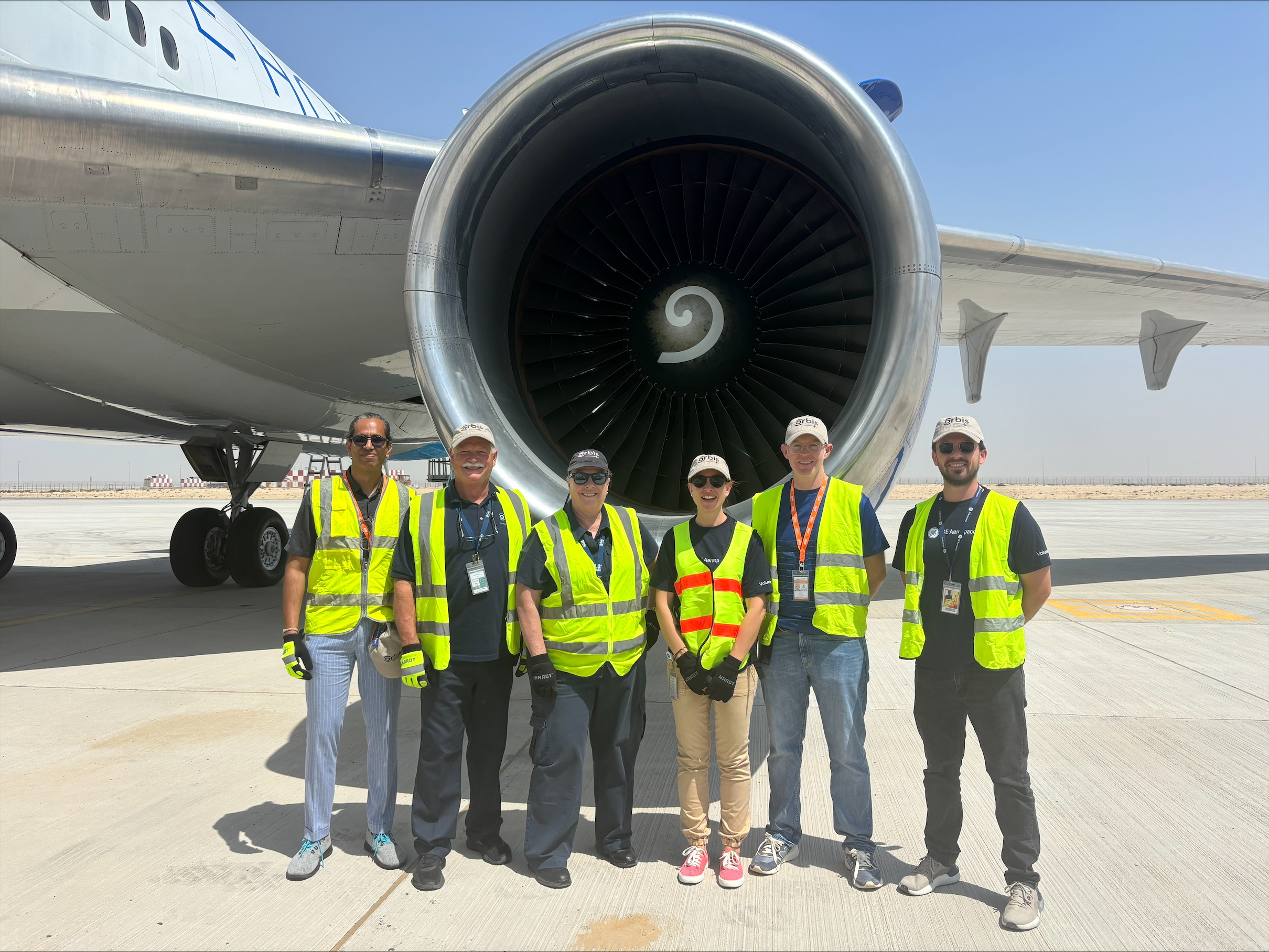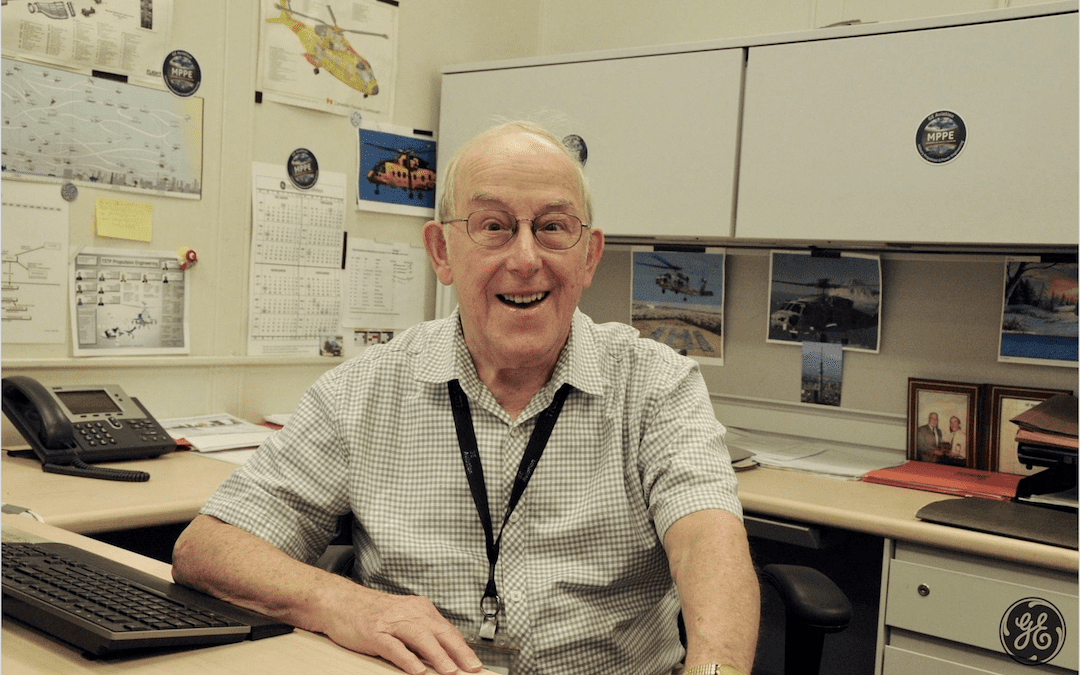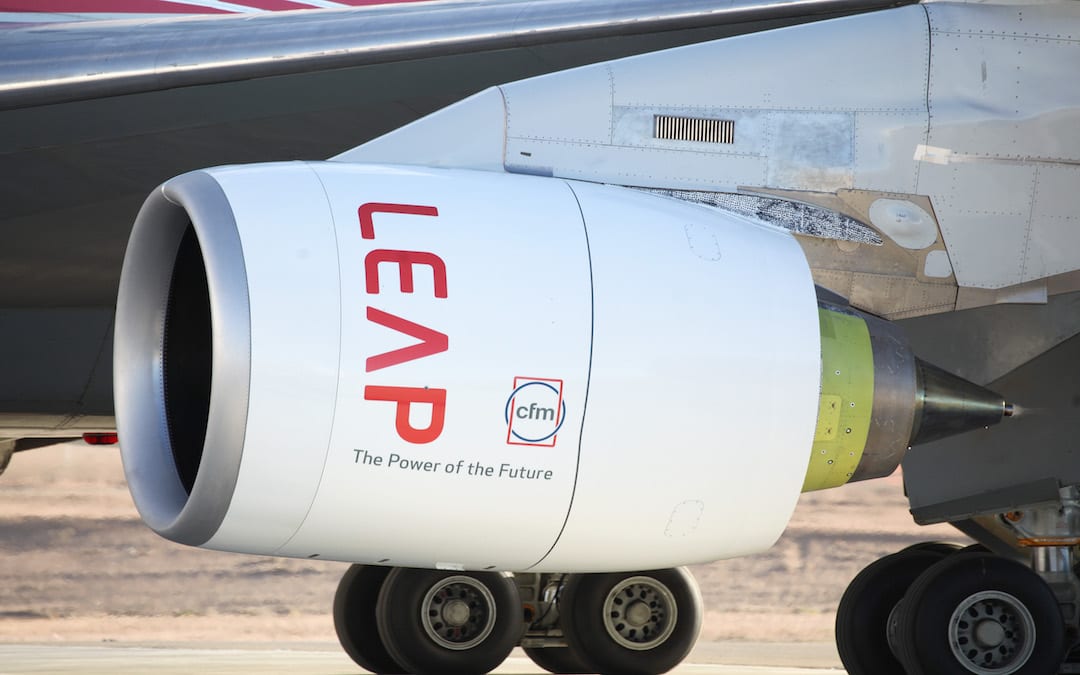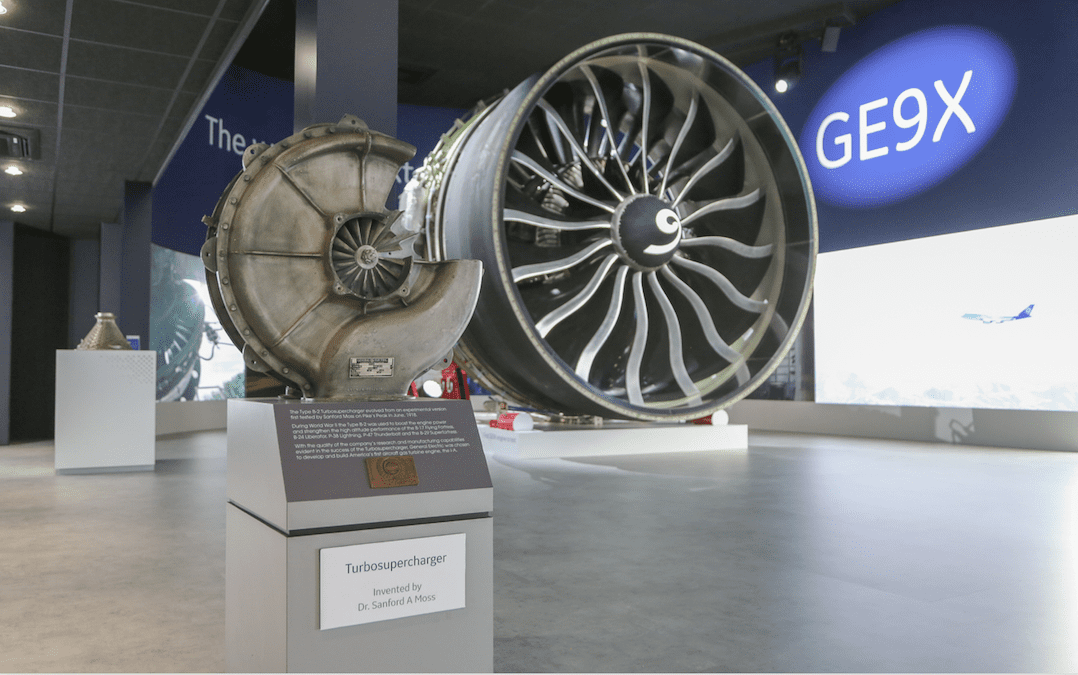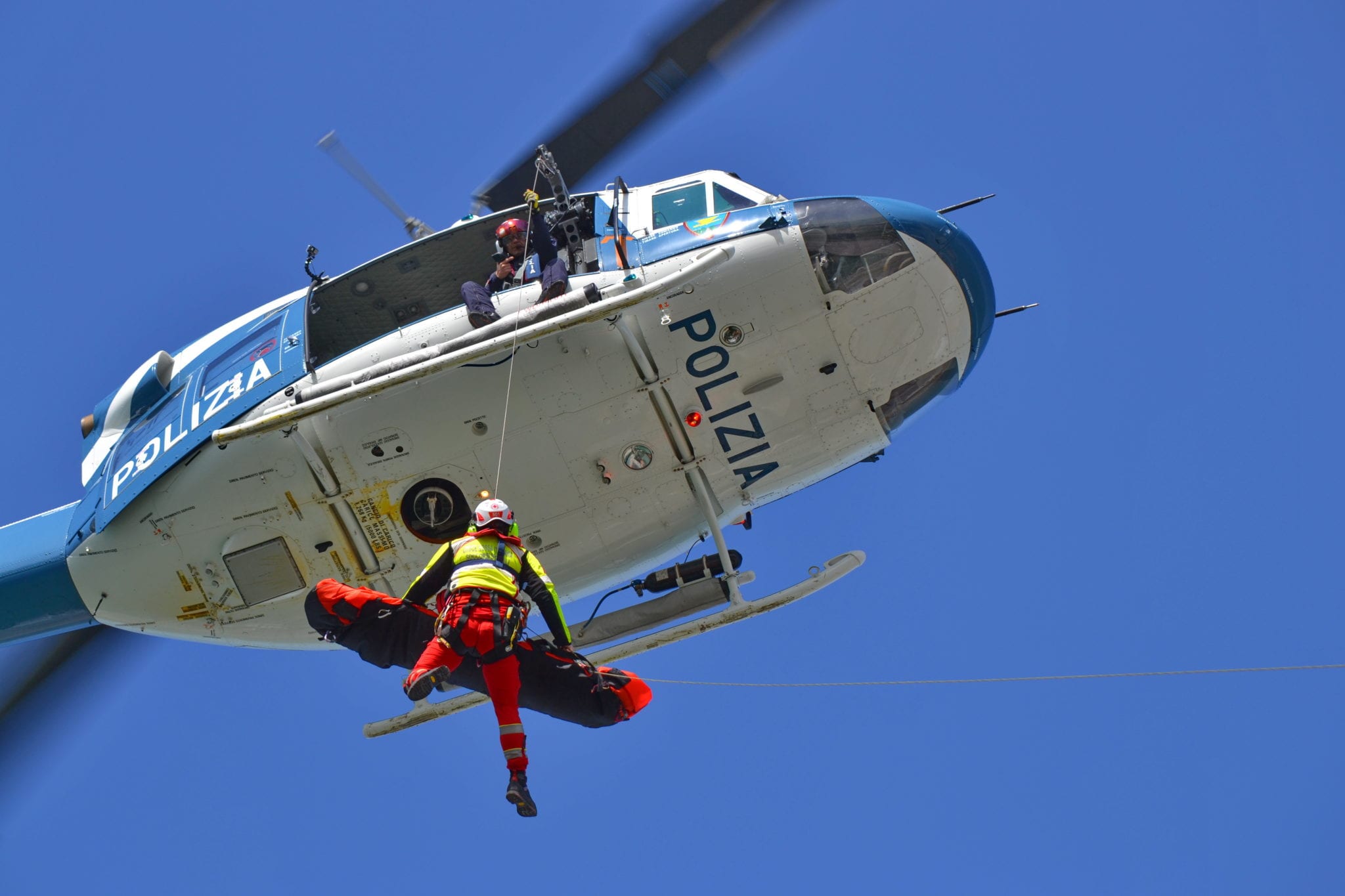1 Billion Flight Hours: “World-class experience” builds 15,000th CFM56-7B engine
June 4, 2019 | by Chelsey Levingston
In April, CFM International (CFM) reached a new production milestone when employees built and assembled the 15,000th CFM56-7B jet engine destined for a Boeing Next-Generation 737 airplane.
CFM International is a 50-50 joint venture between GE and Safran Aircraft Engines.
When CFM56 engines first entered service in 1982—and when the -7B model entered service in 1997— the program experienced the fastest ramp-up in commercial aviation history until the introduction of CFM International’s LEAP engine in 2016. Over the past 37 years, CFM56 engines spanning six different models have been delivered to power Boeing and Airbus aircraft. The fleet has logged more than one billion engine flight hours, a feat never accomplished before by any aviation power plant.
“It’s nice to be part of something that’s successful,” said Wiley West, a 38-year GE Aviation employee who retired at the end of April as a production assembly mechanic for CFM56-7B rotor assembly.
The CFM56 engine is known in the industry for its reliability. The engine has a 94 percent utilization rate and, in the skies, carries about 7 million passengers a day. Its 99.96 percent engine dispatch reliability rate means CFM56 has one delay or cancellation every 2,500 departures.
Matt Angst, a production mechanic who now works on CFM56-7B engine cores for final assembly in Evendale, Ohio, has spent over 30 years in the aviation industry beginning as an airline mechanic.
“When you think about the number of parts that go into this engine from step one until it’s shipped, that it can go through the whole process with very few issues when it’s tested, it’s amazing,” Angst said, who joined GE seven years ago.
Angst, who flies a Piper Comanche for fun, finds it hard to imagine a program spending one billion hours in flight.
“What makes a good engine? From the pilot perspective, I would say reliability. It is pretty nerve racking to have engine trouble, especially when you only have one,” Angst said. “From the mechanic point of view, reliability is high on the list, but ease of maintenance is right up there also.”
He’s never piloted a plane powered by CFM56 engines, but says sales wouldn’t be what they were if customers didn’t consider the engine a good choice.
“The operators must be pleased with the reliability and operating costs or they would have looked elsewhere to find something better,” he said.
Along with the thousands of GE Aviation and Safran Aircraft Engines employees around the world who’ve helped build the CFM56 product line over the years, there are currently over 20,000 engineers, technicians, sourcing specialists and other employees who each play a role to produce the engine or maintain the flying fleet. Final assembly of the -7B model takes place at GE Aviation’s headquarters in Evendale.
Vera Bonner’s first job 40 years ago in Evendale was cleaning restrooms. She later moved to the shop floor and worked as a drill operator, which, at the time, allowed her to be considered for a mechanic position. For the past 20 years, she’s worked as a production assembly mechanic, with her current role helping receive incoming material, ensuring fellow mechanics have the right supplies to do their jobs and tracking priorities for her team’s daily work.
Within the last five years, the CFM production line Bonner works on adopted a teaming approach, pairing employees to help meet demands of growing commercial engine orders and material shortages.
“This team loves a challenge. They’re up for the challenge and we get it done with quality,” Bonner said.
Working at GE has offered West, the production mechanic for rotors, opportunities he might not have otherwise experienced. He had just turned 20-years-old when he started working at GE. Thanks to employee programs to further his training, West worked his way up to his current position and now assembles turbine rotors, an essential part of the engine’s hot section.
As a production mechanic for the last 12 years, West’s responsibilities are to stack the individual turbine components to build the rotor, ensure proper blades are installed, inspect blade conditions and verify turbine measurements are within specifications.
“It’s something that makes you proud to talk about,” even if people don’t understand what internal rotating turbine assembly means. This section also becomes enclosed when the final engine is shipped to the customer and isn’t visible from the outside. “We are actually creating the very beginning of the engine,” and the propulsion process, West said.
“I’m going to miss the involvement,” he said about retiring. “Each week is a goal we have to achieve as a team and it takes everybody to achieve that goal to be successful, week in and week out. That’s something you become a part of, it becomes a part of you.”
No two workdays are the same, said Dave Schmitt, the operations leader and process engineer for CFM56 engine assembly, also at the Evendale manufacturing plant.
“The CFM engine and core assembly team experience is world class,” Schmitt said. “The diversity in the team’s experience is what truly enables them to accomplish great things, such as meeting this milestone. Experience ranges from 40-plus years with GE Aviation, to 20 years airline industry experience, to just completing Airframe and Powerplant (A&P) school.”
“Their experiences allow for them to grow each other, using the more experienced individuals to mentor and transfer knowledge to the newest members,” Schmitt said.
As a five-year GE aviation employee, Schmitt is considered “new” amongst the long-tenured production assembly mechanic population. He relies on the larger team’s experience to plan production processes, achieve a consistent assembly production rate and meet customer delivery requirements.
“When you look at the accomplishments, just through the history of GE, and to be part of that family and success, you definitely take a lot of pride in it,” Schmitt said.
CFM International is a 50-50 joint venture between GE and Safran Aircraft Engines.
When CFM56 engines first entered service in 1982—and when the -7B model entered service in 1997— the program experienced the fastest ramp-up in commercial aviation history until the introduction of CFM International’s LEAP engine in 2016. Over the past 37 years, CFM56 engines spanning six different models have been delivered to power Boeing and Airbus aircraft. The fleet has logged more than one billion engine flight hours, a feat never accomplished before by any aviation power plant.
“It’s nice to be part of something that’s successful,” said Wiley West, a 38-year GE Aviation employee who retired at the end of April as a production assembly mechanic for CFM56-7B rotor assembly.
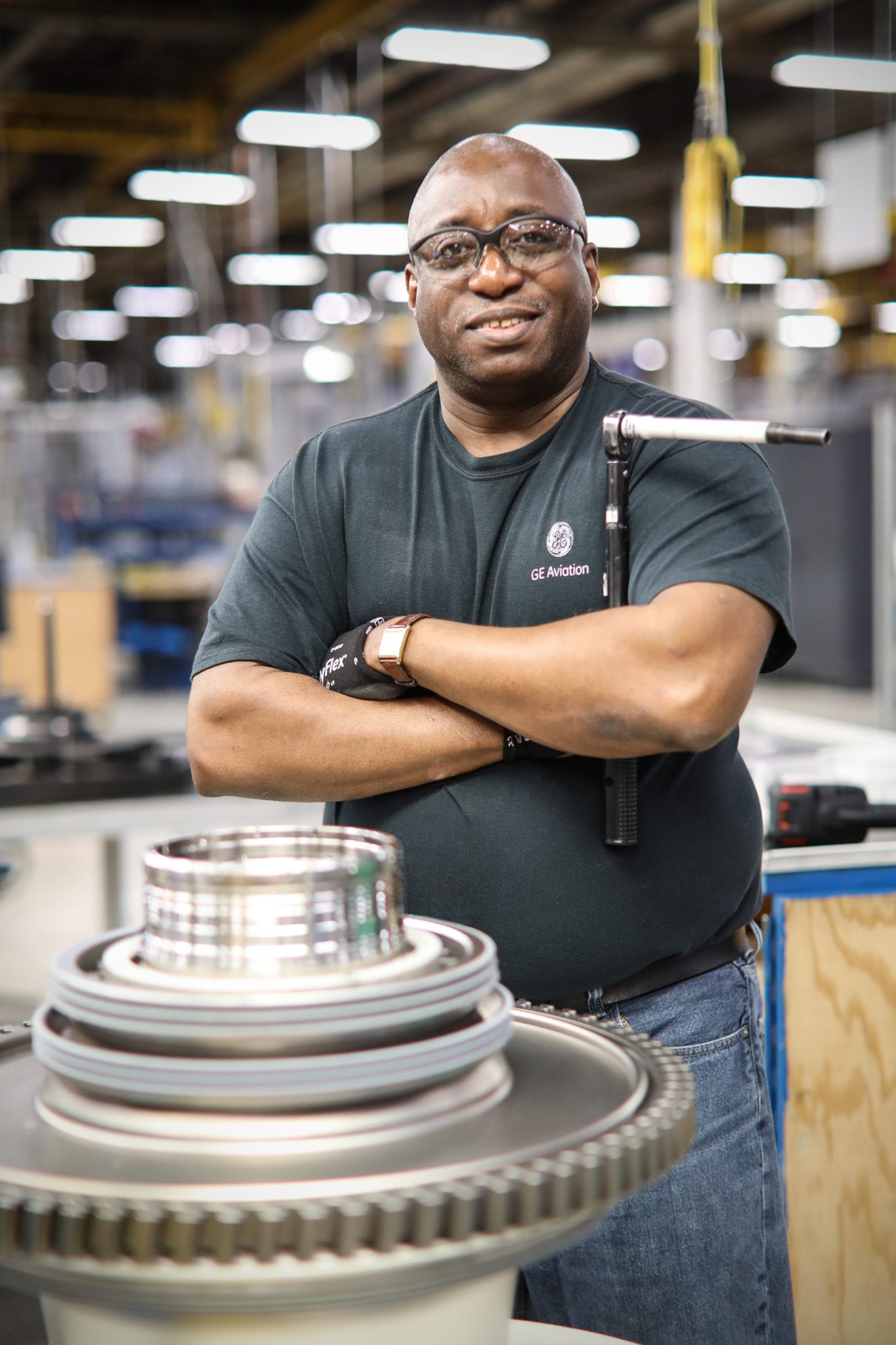 Wiley West, a production assembly mechanic for CFM56-7B rotor assembly, retired in April after 38-years at GE Aviation.
Wiley West, a production assembly mechanic for CFM56-7B rotor assembly, retired in April after 38-years at GE Aviation.
The CFM56 engine is known in the industry for its reliability. The engine has a 94 percent utilization rate and, in the skies, carries about 7 million passengers a day. Its 99.96 percent engine dispatch reliability rate means CFM56 has one delay or cancellation every 2,500 departures.
Matt Angst, a production mechanic who now works on CFM56-7B engine cores for final assembly in Evendale, Ohio, has spent over 30 years in the aviation industry beginning as an airline mechanic.
“When you think about the number of parts that go into this engine from step one until it’s shipped, that it can go through the whole process with very few issues when it’s tested, it’s amazing,” Angst said, who joined GE seven years ago.
Angst, who flies a Piper Comanche for fun, finds it hard to imagine a program spending one billion hours in flight.
“What makes a good engine? From the pilot perspective, I would say reliability. It is pretty nerve racking to have engine trouble, especially when you only have one,” Angst said. “From the mechanic point of view, reliability is high on the list, but ease of maintenance is right up there also.”
He’s never piloted a plane powered by CFM56 engines, but says sales wouldn’t be what they were if customers didn’t consider the engine a good choice.
“The operators must be pleased with the reliability and operating costs or they would have looked elsewhere to find something better,” he said.
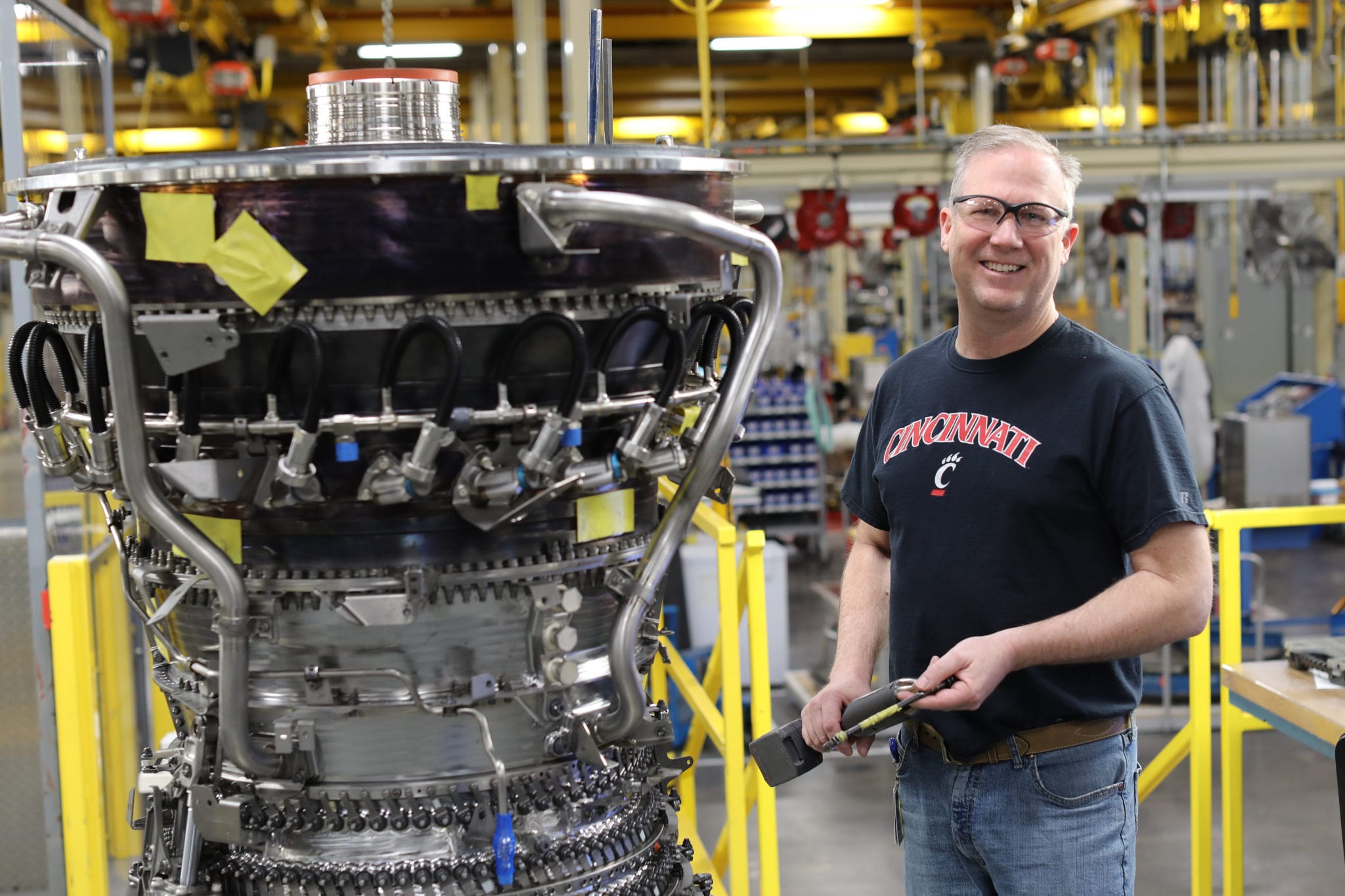 Matt Angst is a production mechanic who works on CFM56-7B engine cores for final assembly in Evendale, Ohio.
Matt Angst is a production mechanic who works on CFM56-7B engine cores for final assembly in Evendale, Ohio.
Along with the thousands of GE Aviation and Safran Aircraft Engines employees around the world who’ve helped build the CFM56 product line over the years, there are currently over 20,000 engineers, technicians, sourcing specialists and other employees who each play a role to produce the engine or maintain the flying fleet. Final assembly of the -7B model takes place at GE Aviation’s headquarters in Evendale.
Vera Bonner’s first job 40 years ago in Evendale was cleaning restrooms. She later moved to the shop floor and worked as a drill operator, which, at the time, allowed her to be considered for a mechanic position. For the past 20 years, she’s worked as a production assembly mechanic, with her current role helping receive incoming material, ensuring fellow mechanics have the right supplies to do their jobs and tracking priorities for her team’s daily work.
Within the last five years, the CFM production line Bonner works on adopted a teaming approach, pairing employees to help meet demands of growing commercial engine orders and material shortages.
“This team loves a challenge. They’re up for the challenge and we get it done with quality,” Bonner said.
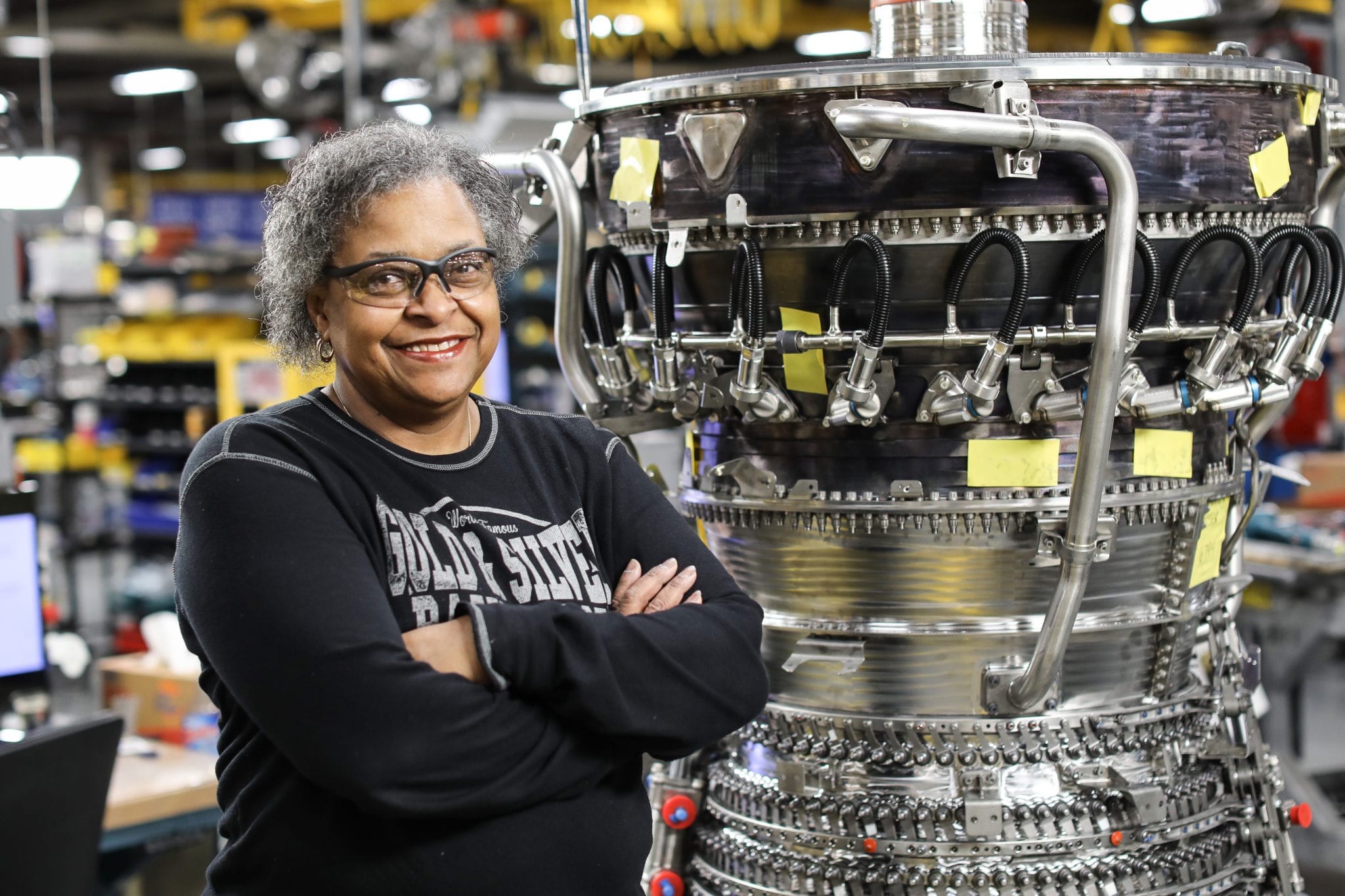 For the past 20 years, Vera Bonner has worked as a production assembly mechanic at GE Aviation in Evendale, Ohio.
For the past 20 years, Vera Bonner has worked as a production assembly mechanic at GE Aviation in Evendale, Ohio.
Working at GE has offered West, the production mechanic for rotors, opportunities he might not have otherwise experienced. He had just turned 20-years-old when he started working at GE. Thanks to employee programs to further his training, West worked his way up to his current position and now assembles turbine rotors, an essential part of the engine’s hot section.
As a production mechanic for the last 12 years, West’s responsibilities are to stack the individual turbine components to build the rotor, ensure proper blades are installed, inspect blade conditions and verify turbine measurements are within specifications.
“It’s something that makes you proud to talk about,” even if people don’t understand what internal rotating turbine assembly means. This section also becomes enclosed when the final engine is shipped to the customer and isn’t visible from the outside. “We are actually creating the very beginning of the engine,” and the propulsion process, West said.
“I’m going to miss the involvement,” he said about retiring. “Each week is a goal we have to achieve as a team and it takes everybody to achieve that goal to be successful, week in and week out. That’s something you become a part of, it becomes a part of you.”
No two workdays are the same, said Dave Schmitt, the operations leader and process engineer for CFM56 engine assembly, also at the Evendale manufacturing plant.
“The CFM engine and core assembly team experience is world class,” Schmitt said. “The diversity in the team’s experience is what truly enables them to accomplish great things, such as meeting this milestone. Experience ranges from 40-plus years with GE Aviation, to 20 years airline industry experience, to just completing Airframe and Powerplant (A&P) school.”
“Their experiences allow for them to grow each other, using the more experienced individuals to mentor and transfer knowledge to the newest members,” Schmitt said.
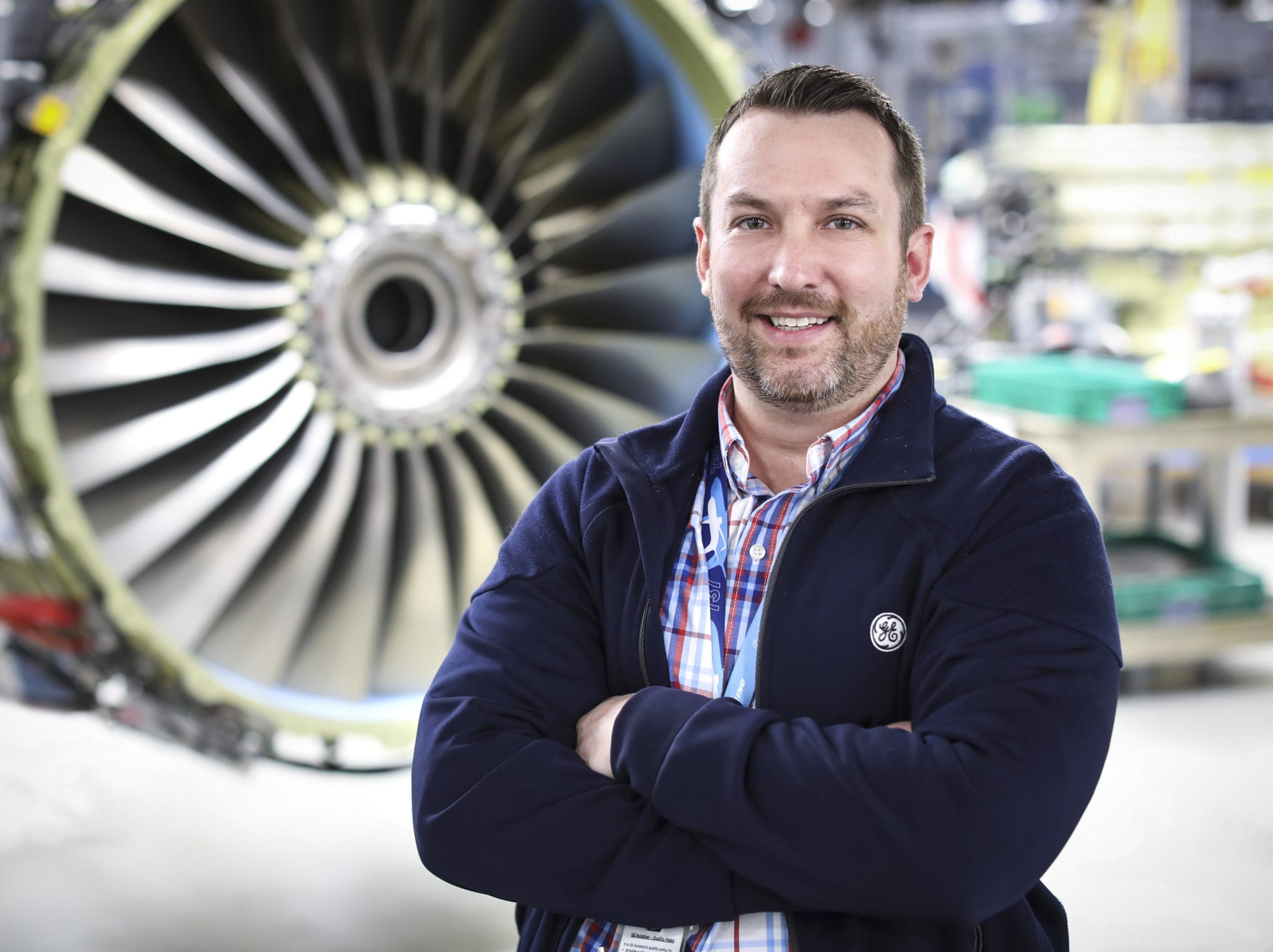 Dave Schmitt is the operations leader and process engineer for CFM56 engine assembly at the Evendale manufacturing plant.
Dave Schmitt is the operations leader and process engineer for CFM56 engine assembly at the Evendale manufacturing plant.
As a five-year GE aviation employee, Schmitt is considered “new” amongst the long-tenured production assembly mechanic population. He relies on the larger team’s experience to plan production processes, achieve a consistent assembly production rate and meet customer delivery requirements.
“When you look at the accomplishments, just through the history of GE, and to be part of that family and success, you definitely take a lot of pride in it,” Schmitt said.
